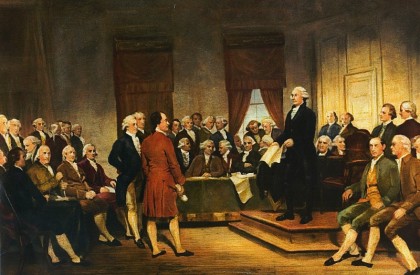Error Has No Rights?
Devra Torres | May 31, 2017 | 1 cmt

My kids and I have been studying American history all year, and we keep running into an objection: What to make of a country being founded on human freedom and consent of the governed rather than on Truth? Wasn't that a fatal flaw that was bound to come back to bite us? Are today's frantic efforts to deny the most obvious truths the predictable result of such a project?
This is definitely one of those bigger-than-a-blogpost questions, but I got an insight into a little piece of it the other day while reading Fr. Martin Rhonheimer's Changing the World: The Timeliness of Opus Dei. (Please don't be put off by the title: as I mentioned here, the book's subject is much broader than it indicates.) With the Second Vatican Council's declaration on freedom of religion, he notes,
The Church...surrenders its traditional position that "error has no rights" in society.
This is a turning point which, according to some, marks the Church's capitulation to incoherent modernism--abandoning objectivity and sinking into subjectivism with the rest of society. Why this indifference to the truth? Why put error on a par with it?
But that's not what's going on at all. Rhonheimer continues:
With this, [the Church] acknowledges the fact that, in political and juridical terms, neither truth nor error can possess rights, since only persons can do that; and that asserting the rights of truth in contrast to error, which lacks rights, leads to the political inequality of persons in regard to rights and freedoms: in other words, to the domination of some by others in the name of truth [emphasis added[.
Let's take a minute to parse this.
Only in a metaphorical sense did we ever grant or deny rights to "error." Since that's the case, we need to look to what happens to the persons who are in error when "error" is stripped of rights: namely, that these persons are stripped of certain rights and freedoms. Politically speaking, some become more equal than others.
You might think: Well, that's inevitable in a rightly ordered society. You might claim that such political inequality works out for the good of the error-ridden and the error-free alike. All opinions aren't equal; why should all people be treated that way?
Setting aside for now whether the point is valid, there's another problem. In a fallen world, what we see is not just the domination of some by others for the sake of truth, but "the domination of some by others in the name of truth [emphasis added]." Some who act "in the name of truth" may be mistaken in thinking that truth is on their side. Others who set themselves up as spokesmen for truth aren't even well-meaning; thry're as indifferent about the matter as the most shameless relativist. They just find "truth" a handy tool for oppressing people they want to oppress.
Rhonheimer continues:
As far as personal freedom in general is concerned, the conception, which expresses the ethos of modern political culture, was fully accepted for the first time in John Paul II's encyclical Centesimus Annus.... While traditional Catholic teaching speaks of the "dignity of the state" and of state authority as an image of divine authority...Centesimus Annus no longer situates "the visible image of the invisible God" in the state, but rather in the human person; thus it is the person, not the state or truth that is "the natural subject of rights that no one may violate. No longer is there talk of the "rights and obligations of the state" but of the rights and freedoms of the person or the citizen.
It's a funny thing, because the focus on personal dignity is firmly grounded in the Church's own theology--even though her social and political teaching were late to acknowledge this. Yet at the same time, the rest of the world seems to be backing away from it. New Zealand and India have recently granted "human rights" to certain rivers. Corporations have long been declared "persons" for legal purposes, while human beings in the womb have been denied the title. The line between human persons and animals gets blurrier by the day.
And "Error has no rights!" would be a fitting battle cry for the witch-hunting fever that has American universities in its grip these days. Predictably, those in power get to determine what counts as "error," and the consequences of crossing whatever line they draw are anything but theoretical for the ones who are banned from campus or hounded out of their jobs.
Rhonheimer does clarify how his points apply to the American experiment. Human freedom and consent of the governed only enjoy the exalted place they do because of a prior moral stance, a prior truth claim, about the dignity of the person. Attempts to make the Founding Fathers champions of liberty out of contempt or indifference for Truth miss the point.
But Rhonheimer says it better. I urge you to read the whole thing.


Comments (1)
Sam Roeble
Jun 9, 2017 2:16pm
Yes, "we hold these truths to be self-evident" is no longer a given. The natural law is unfamiliar. However, conscious error, or as VCII said "immunity to truth", still has no rights because it is insincere, e.g. pro choice ideology or any other ends justify means mindset